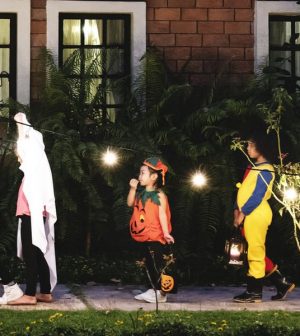- Could Your Grocery Store Meat Be Causing Recurring UTIs?
- Are You Making This Expensive Thermostat Error This Winter?
- Recognizing the Signs of Hypothyroidism
- 10 Strategies to Overcome Insomnia
- Could Artificial Sweeteners Be Aging the Brain Faster?
- Techniques for Soothing Your Nervous System
- Does the Water in Your House Smell Funny? Here’s Why
- Can a Daily Dose of Apple Cider Vinegar Actually Aid Weight Loss?
- 6 Health Beverages That Can Actually Spike Your Blood Sugar
- Treatment Options for Social Anxiety Disorder
Check Those Halloween Treats So They’re Safe to Eat

Almost 41 million American children will don costumes and go trick-or-treating tonight, so all parents should remember that not every treat is safe for their kid.
Inspect your children’s candy haul for signs of tampering before you let them eat anything, said Bruce Ruck, managing director of the New Jersey Poison Control Center at Rutgers New Jersey Medical School’s department of emergency medicine.
Opened wrappers, wrapping that doesn’t match the candy inside, labels with misspelled words or candy that looks or smells strange can all suggest possible tampering.
Be alert for marijuana edibles that can look like store-bought candy, but have slightly different spellings or wrappers. Ecstasy pills and other drugs can also look like candy, Ruck added.
Food allergies are another potential threat. One in 13 children under the age of 18 is allergic to foods such as peanuts, wheat, milk, tree nuts or eggs. If your child is allergic, check the treats they collect on Halloween, Ruck said in a Rutgers news release.
Be careful with face paint and makeup, which may cause skin irritation. Buy from reputable sources and check the ingredients for allergens. Test the product by applying it to a small area, Ruck recommended.
Some cosmetics and face paints, especially imported ones and those at bargain stores, have been found to contain lead. After using face paint, wash hands with soap and water before eating.
Don’t wear non-prescription costume contact lenses. They are not approved by the U.S. Food and Drug Administration and could contain harmful chemicals. Only buy decorative contact lenses from retailers that require a prescription and sell FDA-approved products.
Last, but not least, if you have an adult Halloween party, keep alcohol away from children and pets.
Other Halloween-related dangers for pets include chocolate, cocoa, candy and other products that contain the artificial sweetener xylitol. These are poisonous to pets and can cause vomiting, diarrhea, seizures or even death, Ruck warned.
More information
The National Safety Council offers more Halloween safety tips.
Source: HealthDay
Copyright © 2026 HealthDay. All rights reserved.










